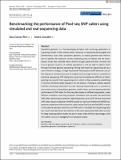Por favor, use este identificador para citar o enlazar a este item:
http://hdl.handle.net/10261/251033COMPARTIR / EXPORTAR:
 SHARE SHARE
 CORE
BASE CORE
BASE
|
|
| Visualizar otros formatos: MARC | Dublin Core | RDF | ORE | MODS | METS | DIDL | DATACITE | |

| Título: | Benchmarking the performance of Pool-seq SNP callers using simulated and real sequencing data |
Autor: | Guirao-Rico, Sara CSIC ORCID; González Pérez, Josefa CSIC ORCID | Palabras clave: | Bayesian High-throughput sequencing Low-frequency variants Maximum likelihood Poùlation genomics Site frequency spectrum |
Fecha de publicación: | may-2021 | Editor: | John Wiley & Sons | Citación: | Molecular Ecology Resources 21(4): 1216-1229 (2021) | Resumen: | Population genomics is a fast-developing discipline with promising applications in a growing number of life sciences fields. Advances in sequencing technologies and bioinformatics tools allow population genomics to exploit genome-wide information to identify the molecular variants underlying traits of interest and the evolutionary forces that modulate these variants through space and time. However, the cost of genomic analyses of multiple populations is still too high to address them through individual genome sequencing. Pooling individuals for sequencing can be a more effective strategy in Single Nucleotide Polymorphism (SNP) detection and allele frequency estimation because of a higher total coverage. However, compared to individual sequencing, SNP calling from pools has the additional difficulty of distinguishing rare variants from sequencing errors, which is often avoided by establishing a minimum threshold allele frequency for the analysis. Finding an optimal balance between minimizing information loss and reducing sequencing costs is essential to ensure the success of population genomics studies. Here, we have benchmarked the performance of SNP callers for Pool-seq data, based on different approaches, under different conditions, and using computer simulations and real data. We found that SNP callers performance varied for allele frequencies up to 0.35. We also found that SNP callers based on Bayesian (SNAPE-pooled) or maximum likelihood (MAPGD) approaches outperform the two heuristic callers tested (VarScan and PoolSNP), in terms of the balance between sensitivity and FDR both in simulated and sequencing data. Our results will help inform the selection of the most appropriate SNP caller not only for large-scale population studies but also in cases where the Pool-seq strategy is the only option, such as in metagenomic or polyploid studies. | Versión del editor: | https://doi.org/10.1111/1755-0998.13343 | URI: | http://hdl.handle.net/10261/251033 | DOI: | 10.1111/1755-0998.13343 | ISSN: | 1755-098X | E-ISSN: | 1755-0998 |
| Aparece en las colecciones: | (IBE) Artículos |
Ficheros en este ítem:
| Fichero | Descripción | Tamaño | Formato | |
|---|---|---|---|---|
| Pool-seq_SNP.pdf | 663,4 kB | Adobe PDF |  Visualizar/Abrir |
CORE Recommender
PubMed Central
Citations
8
checked on 18-mar-2024
SCOPUSTM
Citations
11
checked on 13-abr-2024
WEB OF SCIENCETM
Citations
12
checked on 27-feb-2024
Page view(s)
90
checked on 18-abr-2024
Download(s)
231
checked on 18-abr-2024

